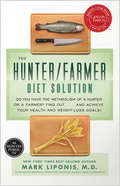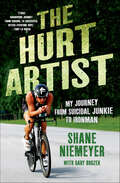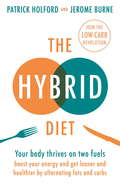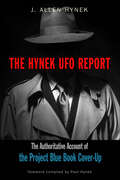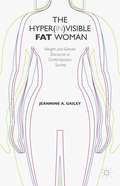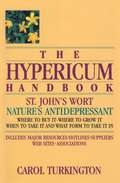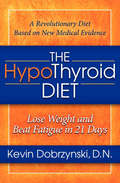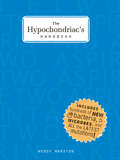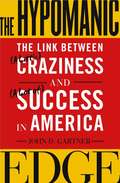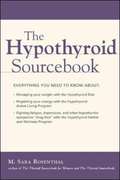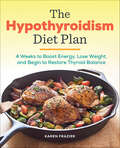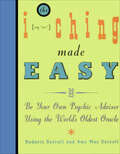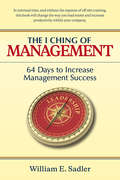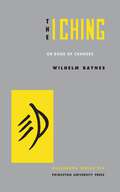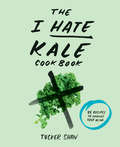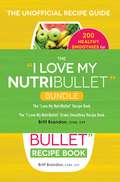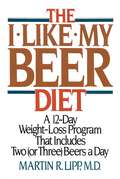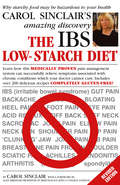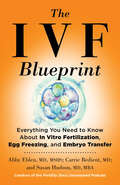- Table View
- List View
The Hunter/Farmer Diet Solution: Do You Have The Metabolism Of A Hunter Or A Farmer? Find Out... And Achieve Your Health And Weight-loss Goals
by Mark LiponisAmericans are overweight, and they're getting heavier. Other than wanting to perform invasive surgical procedures, most doctors offer little help. Their advice is usually "Eat less, exercise more," which falls back on the outdated dogma of calories in/calories out. Medical research on dieting is confusing and often contradictory. Not only are physicians unsure about which weight-loss plan is best, but their patients are, too! It has become an "every one for him- or herself" situation, where we're forced to experiment, hoping to hit on the magic weight-loss formula by chance . . . and the increasing number of fad diets makes our odds of picking the right weight-loss plan even less likely. Why can't the medical industry make sense of the overload of information and give us sound advice that actually enables people to lose weight and improve their health? Fortunately, recent studies have shined a new light on the subject and may finally help us understand a successful way to diet. This research proves what many men and women have learned through trial and error: some do better on a low-carb diet, and others do better on a low-fat diet. This is because some people have the metabolism of a hunter, while others have the metabolism of a farmer. In this groundbreaking book, Dr. Mark Liponis, a leading expert in preventive and integrative medicine, will show you how to determine which type you are so that you can lose weight and improve your health at the same time. Once you know your type, you'll be on the road to successful weight loss and greater health and well-being!
The Hurt Artist: My Journey from Suicidal Junkie to Ironman
by Gary Brozek Shane NiemeyerA gritty memoir that chronicles the author's transformation from a homeless junkie who tried to hang himself in prison to a triathlete competing at the Ironman World Championship.With troubles beginning as early as childhood, the trajectory of Shane Niemeyer's life seemed to have only one direction: down. His struggles with heroin addiction led him to jail, and he eventually hit rock bottom. Soon, his two pack a day cigarette habit was the healthiest thing he did. One dark night in jail, his suicide attempt failed. What happened next transcends the term recovery.The Hurt Artist is the searing yet luminous travelogue of Shane's powerful journey from suicidal addict to Ironman. He vividly depicts the landscape of pain in which he's lived his life—emotional and physical pain inflicted upon him and that he inflicts upon himself, pain that pulls him down, and, in detailing his training, the pain he harnesses to lift himself up. Ultimately, Shane's story is one of redemption and triumph, a lesson in the value of second chances and a clear reminder that nobody, regardless of how seemingly desperate their circumstances, is beyond the reach of salvation.From inmate #71768 to Ironman Triathlon World Championship competitor #1419, Shane paints a stirring self-portrait in this hilarious, horrifying, and hopeful account that is sure to hook readers of edgy sports biographies.
The Hybrid Diet: Your body thrives on two fuels - discover how to boost your energy and get leaner and healthier by alternating fats and carbs
by Jerome Burne Patrick Holford BSc, DipION, FBAA radically different, practical and doable way to achieve a healthy weight and substantially reduce your risk of diseases such as diabetes, heart disease, cancer and dementia.'If you follow the advice here, you will improve your health, lose weight, avoid diabetes and reduce your risk of cancer and Alzheimer's. What more could you ask?' Dr Malcolm Kendrick, GP and author of The Great Cholesterol Con'A highly readable, smart and well-reasoned book based on the latest generation of rigorous science' Nina Teicholz, author of The Big Fat Surprise, and Adjunct Professor, New York UniversityRecent research has shown that a diet that is very low in carbs and high in good fats is effective for weight loss, can counteract many diseases and also help athletic performance and endurance. The drawback is that it is difficult to stick to - because most people love carbs. But, as The Hybrid Diet demonstrates, we don't need to choose. The human body has been designed through millions of years of evolution to burn two different sources of fuel - glucose (which comes from the carbohydrates in fruit and vegetables) and ketones (which are made in the body from fat) - and to switch between them when food is scarce.The point of The Hybrid Diet is to show you how to make the best use of both options when you need them, and how best to switch between them. In their quest to discover the perfect diet, leading health journalist Jerome Burne and nutrition expert Patrick Holford have examined the latest cutting-edge science and have put together a plan that is sound, simple and delicious - one that is based on how your body works best.
The Hybrid Diet: Your body thrives on two fuels - discover how to boost your energy and get leaner and healthier by alternating fats and carbs
by Patrick Holford Jerome BurneA radically different, practical and doable way to achieve a healthy weight and substantially reduce your risk of diseases such as diabetes, heart disease, cancer and dementia.'If you follow the advice here, you will improve your health, lose weight, avoid diabetes and reduce your risk of cancer and Alzheimer's. What more could you ask?' Dr Malcolm Kendrick, GP and author of The Great Cholesterol Con'A highly readable, smart and well-reasoned book based on the latest generation of rigorous science' Nina Teicholz, author of The Big Fat Surprise, and Adjunct Professor, New York UniversityRecent research has shown that a diet that is very low in carbs and high in good fats is effective for weight loss, can counteract many diseases and also help athletic performance and endurance. The drawback is that it is difficult to stick to - because most people love carbs. But, as The Hybrid Diet demonstrates, we don't need to choose. The human body has been designed through millions of years of evolution to burn two different sources of fuel - glucose (which comes from the carbohydrates in fruit and vegetables) and ketones (which are made in the body from fat) - and to switch between them when food is scarce.The point of The Hybrid Diet is to show you how to make the best use of both options when you need them, and how best to switch between them. In their quest to discover the perfect diet, leading health journalist Jerome Burne and nutrition expert Patrick Holford have examined the latest cutting-edge science and have put together a plan that is sound, simple and delicious - one that is based on how your body works best.
The Hygienic Cook Book
by John KelloggPublished in 1876 in Michigan, The Hygienic Cook Book was part of the 19th century health reform movement that stressed a vegetarian diet to achieve wellness. Author John Harvey Kellogg, an American physician, took the health reformer&’s diet even further by emphasizing abstinence from caffeine, alcohol, spices, condiments, dairy, eggs, and vinegar. Kellogg believed that &“[c]ondiments are innutritious and irritating….they irritate the digestive organs, impairing their tone and deranging their function.&” Above all, he stressed the importance of bowel health for an overall healthy body. Along with tips for reforming the diet as well as reasons for abstaining from animal products, spices, and condiments, The Hygienic Cook Book also contains wholesome recipes such as Johnny Cakes, Potato Bread, Apple Brown Bread, Graham Crackers, and Peach Toast. While Kellogg&’s hygienic diet might not be for all tastes, The Hygienic Cook Book offers a fascinating look into the 19th century&’s new focus on a healthier diet. This edition of The Hygienic Cook Book was reproduced by permission from the volume in the collection of the American Antiquarian Society, Worcester, Massachusetts. Founded in 1812 by Isaiah Thomas, a Revolutionary War patriot and successful printer and publisher, the society is a research library documenting the lives of Americans from the colonial era through 1876. The society collects, preserves, and makes available as complete a record as possible of the printed materials from the early American experience. The cookbook collection comprises approximately 1,100 volumes.
The Hygienic Cook Book
by John KelloggPublished in 1876 in Michigan, The Hygienic Cook Book was part of the 19th century health reform movement that stressed a vegetarian diet to achieve wellness. Author John Harvey Kellogg, an American physician, took the health reformer&’s diet even further by emphasizing abstinence from caffeine, alcohol, spices, condiments, dairy, eggs, and vinegar. Kellogg believed that &“[c]ondiments are innutritious and irritating….they irritate the digestive organs, impairing their tone and deranging their function.&” Above all, he stressed the importance of bowel health for an overall healthy body. Along with tips for reforming the diet as well as reasons for abstaining from animal products, spices, and condiments, The Hygienic Cook Book also contains wholesome recipes such as Johnny Cakes, Potato Bread, Apple Brown Bread, Graham Crackers, and Peach Toast. While Kellogg&’s hygienic diet might not be for all tastes, The Hygienic Cook Book offers a fascinating look into the 19th century&’s new focus on a healthier diet. This edition of The Hygienic Cook Book was reproduced by permission from the volume in the collection of the American Antiquarian Society, Worcester, Massachusetts. Founded in 1812 by Isaiah Thomas, a Revolutionary War patriot and successful printer and publisher, the society is a research library documenting the lives of Americans from the colonial era through 1876. The society collects, preserves, and makes available as complete a record as possible of the printed materials from the early American experience. The cookbook collection comprises approximately 1,100 volumes.
The Hynek UFO Report: The Authoritative Account of the Project Blue Book Cover-Up
by J. Allen HynekThe ultimate guide to Project Blue Book by one of the lead astronomers for the US Air Force program to investigate UFO sightings—and featured in History Channel's Project Blue Book. Originally released in 1977, this new edition by the world's foremost authority on UFOs distills 12,000 sightings and 140,000 pages of Project Blue Book evidence into a coherent explanation. A US Air Force–sponsored UFO-basher for years, Hynek had completely changed his tune by the late 1960s. Whether you believe in little green men or an official government cover-up policy, The Hynek UFO Report is required reading. •Have UFOs really been reported by every nation across the globe? •Can all the eyewitness reports simply be fantasy? •Are we victims of mass hallucination or just plain lies? •Have close encounters actually occurred? Is the government concealing deep secrets at a hidden location? The Hynek UFO Report is rational, logical, and realistic. It is for anyone interested in UFOs, the possibility of extraterrestrial life, and the role of the US government in hiding the truth from the public.
The Hyper(in)visible Fat Woman
by Jeannine A. GaileyIn The Hyper(in)visible Fat Woman Gailey investigates the interface between fat women's perceptions of their bodies and of the social expectations and judgments placed on them. The book explores the phenomenon of 'hyper(in)visibility', the seemingly paradoxical social position of being paid exceptional attention while simultaneously being erased.
The Hypericum Handbook: Nature's Antidepressant
by Carol TurkingtonFor more than 2,000 years, depressed patients have turned to a rangy yellow weed known as hypericum, or St. John&’s wort, to treat symptoms of unrelenting sadness. Ancient healers believed the herb to be so powerful that it not only vanquished depression but also could banish evil spirits forever.Today, more and more people believe that the herb carries significant power—at least when it come to depression. Nature&’s answer to Prozac has been attracting supporters around the globe as more and more scientists are finding that it works as well as certain antidepressants without the harmful side effects or the high cost.This handbook provides essential guidance to navigating the uses of St. John&’s wort. Within you will find the findings from both U.S. and British studies that support its efficacy treating depression, the different forms you can buy St. John&’s wort in and their varying potencies, How to use St. John&’s wort, how to deal with potential side-effects or drug interactions, how to grow your own, and other possible uses of St. John&’s wort. This comprehensive handbook will provide you with all you need to make an educated decision regarding the alternative, natural treatment of your depression.
The HypoThyroid Diet: Lose Weight and Beat Fatigue in 21 Days
by Kevin DobrzynskiA new diet based on cutting-edge science for individuals struggling with hypothyroidism. Is hypothyroidism affecting your life, work, and family? Do you feel like a different person now than you were a few years ago? If so, nutritionist and personal trainer Dr. Kevin Dobrzynski can help you regain control of your life with The HypoThyroid Diet. The Hypothyroid Diet is a simple step-by-step system that can help you eliminate your symptoms one by one. It shows exactly what to do so you can jumpstart your thyroid, lose weight, beat fatigue, and feel normal again. In The HypoThyroid Diet you will also learn: * A special exercise program for hypothyroidism * How to find the right doctor * What blood tests you need and their values * What supplements you need * Which foods you should eat and which ones to avoid
The Hypochondriac's Handbook
by Wendy MarstonA humorous guide to understanding all that can affect your well-being, from germs to the healthcare industry.Feeling good? Are you sure? This hilarious guide—a sequel to the bestselling Paranoid’s Pocket Guide—is guaranteed to make you wonder. With hundreds of symptoms to watch for and in-depth information on the latest germ mutations, this compendium offers compelling proof that there is always something to worry about, even if you seem to be in perfect shape. A must-have for today’s health-conscious individual, it also reveals worrisome facts about doctors and insurance companies. It’s packed with black-and-white photos documenting everyday items that can menace your health—often seemingly “harmless” items such as a pencil or a water fountain. Fortunately, this book will make you laugh, which releases endorphins and promotes health—for the moment. For soundness of body and mind, read The Hypochondriac’s Handbook. Better safe than sorry!
The Hypomanic Edge: The Link Between (a Little) Craziness and (a Lot of) Success in America
by John D. GartnerWhy is America so rich and powerful? The answer lies in our genes, according to psychologist John Gartner. Hypomania, a genetically based mild form of mania, endows many of us with unusual energy, creativity, enthusiasm, and a propensity for taking risks. America has an extraordinarily high number of hypomanics -- grandiose types who leap on every wacky idea that occurs to them, utterly convinced it will change the world. Market bubbles and ill-considered messianic crusades can be the downside. But there is an enormous upside in terms of spectacular entrepreneurial zeal, drive for innovation, and material success. Americans may have a lot of crazy ideas, but some of them lead to brilliant inventions. Why is America so hypomanic? It is populated primarily by immigrants. This self-selection process is the boldest natural experiment ever conducted. Those who had the will, optimism, and daring to take the leap into the unknown have passed those traits on to their descendants. Bringing his audacious and persuasive thesis to life, Gartner offers case histories of some famous Americans who represent this phenomenon of hypomania. These are the real stories you never learned in school about some of those men who made America: Columbus, who discovered the continent, thought he was the messiah. John Winthrop, who settled and defined it, believed Americans were God's new chosen people. Alexander Hamilton, the indispensable founder who envisioned America's economic future, self-destructed because of pride and impulsive behavior. Andrew Carnegie, who began America's industrial revolution, was sure that he was destined personally to speed up human evolution and bring world peace. The Mayer and Selznick families helped create the peculiarly American art form of the Hollywood film, but familial bipolar disorders led to the fall of their empires. Craig Venter decoded the human genome, yet his arrogance made him despised by most of his scientific colleagues, even as he spurred them on to make great discoveries. While these men are extraordinary examples, Gartner argues that many Americans have inherited the genes that have made them the most successful citizens in the world.
The Hypothyroid Sourcebook
by M. Sara RosenthalHypothyroidism is one of the most common forms of thyroid disease. Myriad symptoms are attributed to this disease, including extreme fatigue, depression, headaches, chest pain, constipation, muscle spasms, weight gain, and more. Written by an acclaimed health author afflicted with hypothyroidism, The Hypothyroid Sourcebook offers in-depth explanations of the thyroid and the disease. The book discusses the pros and cons of possible treatments and provides an extensive list of additional resources.
The Hypothyroidism Diet Plan: 4 Weeks to Boost Energy, Lose Weight, and Begin to Restore Thyroid Balance
by Karen FrazierA food plan to manage hypothyroidism? Naturally.You've been diagnosed with hypothyroidism. Now what? Begin restoring thyroid balance in your body with this simple 4-week meal plan. The Hypothyroidism Diet Plan will help you manage symptoms naturally—and eat well while you do it.This groundbreaking resource is designed specifically for hypothyroidism and features the latest information, food charts, and lifestyle tips. These straightforward strategies can boost energy, prompt weight loss, and bring your body back into balance. The plan uses ingredients free of common allergens and even provides a method to identify potential allergies.The Hypothyroidism Diet Plan includes:Month-long meal plan—Rest easy with 31 days of planned meals, including nutrition facts and shopping lists.100 delicious recipes—Treat yourself to Pancakes with Blueberry Sauce, Creamy Broccoli Soup, Tri-Tip Tacos, and more easy-to-make dishes.Reduce inflammation—These recipes follow the autoimmune protocol to help reduce inflammation and give your body a chance to heal.Managing hypothyroidism is a challenge, but The Hypothyroidism Diet Plan will help you nourish and care for yourself—naturally.
The I Ching Made Easy: Be Your Own Psychic Advisor Using the World's Oldest Oracle
by Roderic Sorrell Amy M. SorrellWith fifteen cents and five minutes, you too can use and understand the I ChingWith six coins (one dime and five pennies) and this easy-to-use guide, tapping into the synchronicity of the universe is simpler and more rewarding than ever.
The I Ching of Management
by William SadlerAnceint, wise, respected; Lao te Ching has enlightened for centuries. Now, in William Sadler's "The I Ching of Management," these teachings take on modern relevance for men and women in all levels of management. This volume contains a substantive introduction on the development of the original "Tao te Ching" and the evolution of its compliled teachings. The purpose of management exceeds that of being the boss or leader of an organization. It is both an art and a skill, explains the author. "The I Ching of Management" assists the manager in tapping his or her natural, inner resources. In becoming a good manager, one begins on a path towards success and personal satisfaction, and achieves a great sense of accomplishment.
The I Ching or Book of Changes: Or Book Of Changes (Bollingen Series #170)
by Richard WilhelmThe bestselling English translation of the ancient classic of Chinese divination that has inspired millions with its timeless insights into the changing nature of all existenceThe I Ching, or Book of Changes, has exerted a living influence in China for thousands of years. Today, it continues to enrich the lives of readers around the world. First set down in the dawn of history as a book of oracles, it grew into a book of wisdom with the inclusion of commentaries on its oracular pronouncements, eventually becoming one of the Five Classics of Confucianism and providing a common source for both Confucianist and Taoist philosophy. This edition of the I Ching is the most authoritative and complete translation available, preserving the spirit of the ancient text while providing a vital key for anyone who seeks to live harmoniously with the immutable law of change.The book presents the sixty-four hexagrams of the I Ching along with their texts and interpretations in a format especially designed for easy reference. Unlike many editions of the I Ching, it also features the Ten Wings, supplemental writings traditionally ascribed to Confucius that provide indispensable insights into the symbolic structure of the hexagrams and their place in a cosmology where change is the only constant.With an illuminating foreword by C. G. Jung and an informative introduction by Richard Wilhelm, this beautiful edition of the I Ching shares the essence of wisdom and a true understanding of life.
The I Hate Kale Cookbook: 35 Recipes to Change Your Mind
by Tucker ShawFrom the author of The I Hate Tofu Cookbook: Tips and recipes that set the record straight on the leafy green everyone loves to hate. There are a lot of reasons to hate kale. It&’s an upstart. It&’s painfully hip. It&’s healthy—almost too healthy. Kale will never be bacon. But if you can get past the hate, you&’ll discover even more reasons to love it. Kale isn&’t just good for you, it&’s also cheap (if you know where to look), versatile (if you know what you&’re doing), and downright delicious (when you have the right recipes, like the ones included here). The I Hate Kale Cookbook teaches you everything you need to know about the infamous green, from where to buy it and how to care for it to handy tips on getting the most out of every bunch. And with thirty-five delectable recipes—from salads and breakfast smoothies to main dishes, side dishes, and party snacks (that&’s right, party snacks)—you won&’t be able to stay a kale hater for long.
The I Love My NutriBullet Bundle: The "I Love My NutriBullet" Recipe Book; The "I Love My NutriBullet" Green Smoothies Recipe Book ("I Love My" Cookbook Series)
by Britt BrandonMillions of people have changed the way they eat—and live—thanks to the NutriBullet. Now, you can treat yourself to the most delicious, healthiest recipes with The &“I Love My NutriBullet&” Collection!Inside, you&’ll learn how to use your NutriBullet to create nutrient-rich smoothies with: The &“I Love My NutriBullet&” Recipe Book The &“I Love My NutriBullet&” Green Smoothies Recipe Book Whether you&’re looking to increase your energy, stimulate weight loss, or improve your skin, you&’ll transform your body from the inside out with these nourishing NutriBullet recipes! *This collection is unofficial and unauthorized. It is not authorized, approved, licensed, or endorsed by NutriBullet, LLC. NutriBullet is a registered trademark of Homeland Housewares, LLC.
The I Quit Sugar Cookbook: 306 Recipes for a Clean, Healthy Life
by Sarah WilsonEasy. Inventive. Delicious.When Sarah Wilson gave up sugar for good, she developed a new repertoire of creative, go-to dishes for breakfast, lunch, and dinner. With 306 satisfying recipes for one-pan wonders, grain-free breakfasts, leftover makeovers, smoothie bowls, and more, this comprehensive cookbook makes living sugar-free simple and sustainable. Start quitting now, with recipes that include: Bacon 'N' Egg Quinoa OatmealGift-Wrapped Miso CodCaramelized Leek, Apple, and Rosemary SoccaGreen Spaghetti and MeatballsTwo-Minute Desk NoodlesBroc Bites and Cauli PopcornCarrot "Bacon"Red Velvet Crunch BowlChocolate Peanut Butter CracklesStrawberry Cheesecake Mug CakeFrom the Trade Paperback edition.
The I-Like-My-Beer Diet: A 12-Day Weight-Loss Program That Includes Two (or Three) Beers a Day
by Martin R. LippThe first thing to be understood about this book is its utter seriousness. This is not a flippant diet but a well-thought-out innovation by a man who has spent years grappling with his own weight problem and his love of beer. Now, believe it or not, thanks to Dr. Lipp you can lose weight without giving up beer on his remarkable I-Like-My-Beer Diet.Recognizing that no one likes to diets or wants to change his or her eating habits forever, Dr. Lipp has devised a weight-loss program designed to take off ten or more pounds in twelve days in as painless a manner as possible—with two (or three) beers a day.Dr. Lipp gives five basic reasons why beer is compatible with weight loss: beer complements a high protein, low-fat diet; beer is itself comparatively low in calories; beer is nutritious; beer is filling; and beer is relaxing, which helps you deal with you deal with the diet-deprivation syndrome.Each day&’s menu program includes breakfast, lunch, dinner, and, of course, beer. As flexible as it is serious, The I-Like-My-Beer Diet offers three options for each meal: recipes for dishes to make at home, suggestions for restaurant dining, and brown bag meals for lunch or dinner.Tips on diet survival at parties and on weekends are included. Calorie listing for most popular domestic and imported beers are provided. The I-Like-My-Beer Diet may sound too good to be true, but it works! So reach for your favorite brew, follow Dr. Lipp&’s diet, and you&’ll find yourself ten or more pounds lighter in just twelve days.Cheers!
The IBS Elimination Diet and Cookbook: The Proven Low-FODMAP Plan for Eating Well and Feeling Great
by Patsy CatsosFrom the leading expert in FODMAPs and IBS, this is the complete guide and cookbook for overcoming IBS by discovering your dietary triggers and building a personalized, doable, and fulfilling diet around nutritious, delicious foods that let you finally feel your best. Patsy Catsos, MS, RDN, LD, pioneered the use of the low-FODMAP diet to find your unique FODMAP fingerprint when she self-published IBS--Free at Last!, ushering in a new era of treating IBS through diet instead of medication. Written for at-home use, her book quickly established itself among doctors and other specialists as an invaluable tool for anyone suffering from IBS, Crohn's disease, ulcerative colitis, SIBO, and gluten sensitivity. This new, definitive edition offers the theory along with a program that walks you through eliminating FODMAPs (difficult-to-digest carbohydrates found in a variety of otherwise healthy foods) and adding them back one by one--the most usable, thorough program available. And its 56 delicious recipes, 24 full-color photos, and comprehensive guides to high- and low-FODMAP foods make this the bible of the low-FODMAP lifestyle. Here is your plan for eating well while finally feeling great.
The IBS Low-Starch Diet: Why starchy food may be hazardous to your health
by Carol SinclairTwenty per cent of the UK population - 12 million people - suffer IBS-related symptoms, but they may be unaware that the simple elimination of starch from their diet can bring dramatic relief from pain and discomfort.In this revised edition, Carol Sinclair, a sufferer who has successfully overcome IBS and arthritic pain, brings you a revolutionary programme for a pain-free future. This practical guide will help millions to reduce their arthritic symptoms, whose pain to date has been relieved only by regular medication, with sometimes dangerous side effects.The diet shows that a gradual reduction of starch in one's diet can dramatically reduce pain in days, to a point where drug usage is reduced and, in some cases, eliminated completely. Details of the discovery - along with case histories and a practical guide - make Carol Sinclair's book a first in the world.The IBS Low-Starch Diet also contains over 200 delicious starch- and gluten-free recipes, along with a comprehensive guide to eating out.
The ICEA Guide to Pregnancy & Birth
by International Childbirth Education AssociationEssential information to help you make informed decisions for a healthy pregnancy, labor, and birth. In this new guide, the International Childbirth Education Association (ICEA) presents the best available evidence-based research on pregnancy, childbirth, and newborn care. Its goal is to help expectant parents understand their options in maternity care, and to guide them as they make informed decisions that are best for them and their families. Written in plain English and organized for easy reference, this is a great resource for any childbirth class.
The IVF Blueprint: Everything You Need to Know About In Vitro Fertilization, Egg Freezing, and Embryo Transfer
by Susan Hudson Abby Eblen Carrie BedientThe definitive guide to IVF from leading physicians who have helped thousands of patients successfully navigate fertility treatment—and will demystify the process for you. Wherever you are in your fertility journey, you&’re bound to have questions. What should I ask at the first doctor visit? Are there supplements that might give my ovaries that extra kick? Do I have a good chance of getting pregnant? Drs. Abby Eblen, Carrie Bedient, and Susan Hudson get real about what you can really expect from IVF—and simplify the complex world of fertility to give you the best possible chance of success. The IVF Blueprint covers every aspect of the process, from preparing for IVF to egg retrieval, recovery, embryo transfer, and more, including valuable insights on: The science behind IVF and egg freezing Step-by-step explanations of each procedure Strategies to maximize your odds of success Emotional and physical considerations during treatment Combining deep expertise, their personal experiences as IVF patients, and the candid style of their Fertility Docs Uncensored podcast, Drs. Abby, Carrie, and Susan are there with you for every step of the way, sharing everything they know to help you welcome your newest family member.
